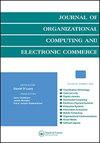USERS’ SOCIOCULTURAL ORIENTATION AND SMART SYSTEMS ACCEPTANCE LINK: DO DEMOGRAPHICS MATTER?
IF 1.9
4区 管理学
Q3 COMPUTER SCIENCE, INFORMATION SYSTEMS
Journal of Organizational Computing and Electronic Commerce
Pub Date : 2019-07-03
DOI:10.1080/10919392.2019.1611287
引用次数: 5
Abstract
ABSTRACT This research investigates the impact of sociocultural determinants on people’s perceptions and usage of smart systems in the United Arab Emirates (UAE). This research used the Theory of reasoned action, Unified theory of acceptance and use of technology (UTAUT) and Frambach and Schillewaert’s framework. These theories which focus on the determinants of technology acceptance behavior of users have been widely used in contemporary technology acceptance research. Data were collected from the UAE Ministries of Foreign Affairs, Health, and Economy using structured questionnaires. A total of 357 responses were analyzed using multivariate statistical techniques such as regression analysis and factor analysis. Multiple regression analysis helped to determine the direction of relationships between the constructs representing users’ sociocultural orientation, attitude toward smart systems and acceptable behavior. Factor analysis served to identify the underlying dimensions of the above constructs. The major finding of this research is that cultural values and peers’ influence significantly affect users’ perceptions and applications of technological innovations. Furthermore, the study reveals that users’ age and gender wield critical moderating effects on the relationship between cultural values and attitude toward smart systems. These findings have important implications for acceptance and implementation of smart systems in the UAE which are highlighted in this paper. This paper also identifies the limits of this research and explores the venues of further research in this field.用户的社会文化取向与智能系统接受度的联系:人口统计数据重要吗?
摘要本研究调查了阿拉伯联合酋长国(UAE)社会文化决定因素对人们对智能系统的感知和使用的影响。本研究采用了理性行动理论、技术接受和使用统一理论以及Frambach和Schillewert的框架。这些关注用户技术接受行为决定因素的理论在当代技术接受研究中得到了广泛应用。数据使用结构化问卷从阿联酋外交部、卫生部和经济部收集。使用多元统计技术,如回归分析和因子分析,共分析了357份回复。多元回归分析有助于确定代表用户社会文化取向、对智能系统的态度和可接受行为的结构之间的关系方向。因子分析用于确定上述结构的潜在维度。本研究的主要发现是,文化价值观和同伴的影响显著影响用户对技术创新的感知和应用。此外,研究表明,用户的年龄和性别对文化价值观和对智能系统的态度之间的关系具有关键的调节作用。这些发现对阿联酋智能系统的接受和实施具有重要意义,本文强调了这一点。本文还指出了这项研究的局限性,并探索了该领域进一步研究的场所。
本文章由计算机程序翻译,如有差异,请以英文原文为准。
求助全文
约1分钟内获得全文
求助全文
来源期刊

Journal of Organizational Computing and Electronic Commerce
工程技术-计算机:跨学科应用
CiteScore
5.80
自引率
17.20%
发文量
7
审稿时长
>12 weeks
期刊介绍:
The aim of the Journal of Organizational Computing and Electronic Commerce (JOCEC) is to publish quality, fresh, and innovative work that will make a difference for future research and practice rather than focusing on well-established research areas.
JOCEC publishes original research that explores the relationships between computer/communication technology and the design, operations, and performance of organizations. This includes implications of the technologies for organizational structure and dynamics, technological advances to keep pace with changes of organizations and their environments, emerging technological possibilities for improving organizational performance, and the many facets of electronic business.
Theoretical, experimental, survey, and design science research are all welcome and might look at:
• E-commerce
• Collaborative commerce
• Interorganizational systems
• Enterprise systems
• Supply chain technologies
• Computer-supported cooperative work
• Computer-aided coordination
• Economics of organizational computing
• Technologies for organizational learning
• Behavioral aspects of organizational computing.
 求助内容:
求助内容: 应助结果提醒方式:
应助结果提醒方式:


